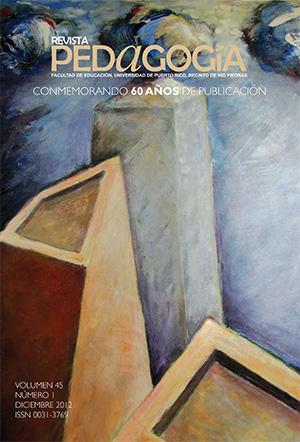Abstract
This collaborative action research, undertaken by a preschool educator and a university professor, explores the challenges and transformations of the preschool teacher during the reconstruction of children‘s portfolios. The results point to the intrinsic relationship between research, reflection, and transformation. They also confirm the significant role of research and critical reflection in the professional transformation of teachers. Likewise, they indicate that the continuous reflective process involved in implementing a portfolio contributes to the professional development of the preschool teacher. This multidimensional, gradual, and profound growth was evident in the use of varied strategies, techniques, and resources. These included the use of technologies in children‘s educational experiences, assessment, and communication with parents, as well as the empowerment of the educator as she strengthened her self-perception and appreciation as a researcher and as a professional who is reflexive, creative, competent, a co-constructor with the children and colleagues of an authentic, responsive, and appropriate portfolio. The resultant portfolio evidenced congruency with the theoretical framework of the educator and the program; also, it was instrumental in the communication with the parents. The greatest challenge faced by the teacher was the limitation of time. The findings emphasized the importance of the teacher‘s initiative, commitment, and creativity, as well as of the administrative supports needed in order to face these challenges.
How to cite:
Pedraza-Burgos, L., & Mendoza-Bas, M. L. (2019). Si creo que cada niño es una mente creativa, pues también yo: Nuevas perspectivas al reconstruir el portafolio de los niños. Pedagogía, 45(1), 59-94. Retrieved from https://revistas.upr.edu/index.php/educacion/article/view/16504
References
Aranguren Peraza, G. (2007). La investigación-acción sistematizadora como estrategia de intervención y formación del docente en su rol de investigador. Revista Pedagogía, 28(82), 173-195. Recuperado de http://www.scielo.org.ve/scielo.php?script=sci_arttext&pid=S0798-97922007000200002&lng=es&nrm=iso
Bataineha, R. F., Al-Karasneha, S. M., Al-Barakata, A. A., Batainehb, R. F. (2007). Jordanian pre-service teachers‘ perceptions of the portfolio as a reflective learning tool. Asia Pacific Journal of Teacher Education, 35(4), 435-454. DOI: 10.1080/13598660701611420
Benson, T. R. & Smith, L. J. (1998). Portfolios in first grade: Four teachers learn to use alternative assessment. Early Childhood Education Journal, 25(3), 172-180.
Bramwell, G., Reilly, R. C., Lilly, F. R., Kronish, N. & Chennabathni, R. (2011). Creative teachers. Roeper Review, 33, 228-238. DOI 10.1080/02783193.2011.603111
Bredekamp, S. & Rosegrant, T. (1992). Reaching potentials: Appropriate curriculum and assessment for young children (vol. I). Washington, DC: National Association for the Education of Young Children.
Cintrón de Esteves, C. M., Cruz, M. I. & Corujo, G. (2006). Preescolares: Principios e ideas que fortalecen un currículo integrado e inclusivo. Colombia: Panamericana Formas e Impresos.
Copple, C. & Bredekamp, S. (2009). Developmentally appropriate practice in early childhood programs serving children from birth through age 8 (3ra ed.).Washington, DC: National Association for the Education of Young Children.
Creswell, J. W. (2009). Research design: Qualitative, quantitative, and mixed methods approaches (3ra ed.). Thousand Oaks, California: Sage Publications, College Press.
David, J. L. (2009). Now what? Collaborative inquiry. Educational Leadership, 66(4), 87-88.
Epstein, A. S. (2007). The intentional teacher: Choosing the best strategies for young children´s learning. Washington, DC: National Association for the Education of Young Children.
Ferrance, E. (2000). Action research. Themes in Education Series. Providence, RI: Laboratory at Brown University.
Freire, P. (1999). Pedagogía del oprimido (52nd ed.). Madrid, España: Siglo XXI.
Goldhaber, J. & Smith, D. (1997). "You look at things differently: " The role of documentation in the professional development of a campus child care center staff. Early Childhood Education Journal, 25(1), 3-10.
Groom, B. & Maunonen-Eskelinen, I. (2006). The use of portfolios to develop reflective practice in teacher training: A comparative and collaborative approach between two teacher training providers in the UK and Finland. Teaching in Higher Education, 11(3), p. 291-300. DOI: 10.1080/13562510600680632
Harris-Helm, J., Beneke, S. & Steinheimer, K. (1998). Windows on learning: Documenting young children‘s work. New York: Teachers College Press.
Jones, E. (2010). A professional practice portfolio for quality learning. Higher Education Quarterly, 64(3), 292-312. DOI: 10.1111/j.1468-2273.2010.00458.x
Jones, J. (2004). Framing the assessment discussion. Young Children, 59(1), 14-18.
Jones, M., & Shelton, M. (2006). Developing your portfolio: enhancing your learning and showing your stuff. New York: Routledge.
Mills, G. E. (2003). Action research: A guide for the teacher researcher (2da ed.). Upper Saddle River, New Jersey: Merrill Prentice Hall.
Morrison, R. (1999). Picture this! Portfolios to facilitate the inclusion of children in preschool settings. Early Childhood Education Journal, 27(1), 63-68.
Osterman, K. (1998). Using constructivism and reflective practice to bridge theory and practice. Paper presented at the Annual Meeting of the American Educational Research Association, San Diego, California, April 13 - 17. (ERIC Document Reproduction Service No. ED425518). Recuperado de http://www.eric.ed.gov/PDFS/ED425518.pdf
Overton, J. (2009). Early childhood teachers in contexts of power: Empowerment and a voice. Australasian of Early Childhood Education, 34(2), 1-10.
Seitz, H. & Bartholomew, C. (2008). Powerful portfolios for young children. Early Childhood Education Journal, 36, 63-68. DOI 10.1007/s10643-008-0242-7
Smith, A. F. (2000). Reflective portfolios: Preschool possibilities. Childhood Education, 76(4), 204-208.
Stoll, L. & Temperly, J. (2009). Creative leadership: A challenge of our times. School Leadership and management, 29(1), 65-78.
The contents published in the Puerto Rico Journal of Education is freely distributed under open access practices, in accordance with the Creative Commons license, Attribution-NonCommercial 4.0 International (CC BY-NC 4.0). Through these principles, the journal and its authors allow readers to access, reproduce and share articles in full text. Users should give credit to authors in a reasonable way without suggesting they have their support. Under no circumstances, readers may make use of the contents for commercial purposes. The authors retain copyright on their works.

